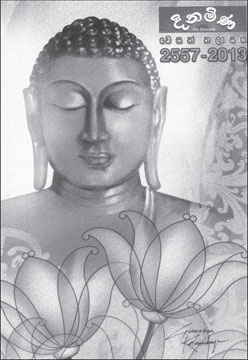|
Dinamina Vesak Kalapaya:
A spiritual memento
Reviewed by Kalakeerthi Edwin Ariyadasa
In the religious history of mankind the Vesak festival occupies a
stature that is unquestionably its own. A multitude of sacred festivals
lends a vital glow to the aesthetic life of men and women right round
the globe.
In all these, the Vesak festival of the Buddhists possesses a holy
distinction that elevates it to an unparalleled spiritual height.
 This is the only religious festival of the world at which three
transcendentally eminent events in the life of the Teacher (in this
instance, in the life of the Buddha) are celebrated on one and the same
day. This is the only religious festival of the world at which three
transcendentally eminent events in the life of the Teacher (in this
instance, in the life of the Buddha) are celebrated on one and the same
day.
Three sacred events
Each year during the Vesak festivities, we salute in a wide variety
of ways the three sacred events the birth of Prince Siddhartha, the
attainment of Supreme Enlightenment by ascetic Siddhartha and the
passing away of the Supremely Enlightened Buddha (Maha Parinibbana).
Over long centuries, the Buddhists in Sri Lanka - along with fellow
followers in various parts of the world - celebrated these three sacred
events in the life of the Buddha (Themangula, in Sinhala) in terms of
the practices, favoured at those times.
The observance of religious practices has always formed a staple
segment in the age-old celebrations of Vesak.
Over and above these moral and spiritual activities, people resorted
to aesthetically satisfying pursuits as well.
Pandals
They would construct pandals (torana) utilising material readily
available in the villages. The simple structures of those days were in
total contrast to the pandals of our day which are electrically powered
or at times even digitally vitalised.
The Vesak lantern came into its own at this time. They were either
simple or complex in terms of the inclinations of the devotees who
constructed them. In recent years, as an outcome of lavish patronage and
the contests organised by various institutions the Vesak decorations
have turned out to be highly impressive displays of inventiveness of the
devotees.
Once, I was overwhelmed at the sight of a statue of the Buddha, made
entirely out of empty water-bottles.
In the past there were theatrical and musical performances. Stage
plays, puppet shows, dances presented by those wearing papier mache
head-gear, entertainingly expressed the Vesak fervour of some devotees.
Vesak cards
In the early days of our youth, we witnessed Vesak cards - a derivate
perhaps of the itinerant Christmas cards.
Today we have groups of devotional singers performing with a
sophisticated elitism.
In this whole range of Vesak festivities there is a discernible
element of ephemerality. The Vesak lanterns decay, deteriorate or burn.
The elaborate decorations have to be dismantled. The resonance of the
devotional songs fade away.
After the introduction of the printed word, a new genre Vesak
literature made its appearance. The newspapers initiated the practice of
bringing out special supplements containing articles relating to Vesak.
Way back in the late 1930s, special Vesak souvenirs that could be
kept preserved over a considerable period of time made their appearance.
These bound publications, in magazine format, acquired the title Vesak
Kalapa (Special Vesak issue).
I believe, that, these special Vesak publications, were initiated by
Lake House.
Vesak number
As a teenager, way back in the late 1930s. I remember, poring over
with avid concentration - a Lake House Vesak number in Sinhala.
This specific issue of the Dinamina Vesak Kalapaya (as it was
discribed) was printed on art paper. I vividly remember the Vesak number
printed with a photograph of the Buddhist shrine Senasungala.
This way, the Dinamina Vesak Kalapaya has continued to contribute a
series of Vesak publications that the readers could have in a permanent
collection. The publication was in total contrast to other Vesak
activities most of which were ephemeral.
From the early days, the annual Vesak Kalapaya extended patronage to
such eminent men of letters as Martin Wickremasinghe, Munidasa
Kumaratunga and personalities of that ilk.
Tradition
The current issue of this series of Vesak numbers continues the
tradition of these Vesak publications, performing a substantial service
to the devoted readers.
The Vesak number for 2013, displays on its cover a serene portrayal
of the Supreme Buddha. This Buddha portrayal is by distinguished artist
Gunasiri Kolombage who has earned a reputation for his recent exquisite
gallery of Buddha portraits.
The present issue of the Dinamina Vesak number for 2013 opens with a
moving spiritual lyric by Ven. Rambukana Siddhartha Thera.
Aggamaha Panditha, Ven. Kumburugamuwe Vajra Maha Thera presents a
discourse analysing the philosophical significance of Vesak.
The total publication is a veritable treasury of absorbing
contributions both in prose and verse.
Erudite members of the clergy and learned lay persons jointly convert
this publication with a work that should have a permanent place in
monasteries, educational institutions, libraries and in homes.
Graphic arts
The typographical personality of the work, reflect vividly the
sophisticated progress of graphic arts.
The editor of the publication Ayanthi Vithana has brought into being
a spiritual memento of which Lake House can be justly proud.
The work has benefited from the wisdom of the editor Dinamina media
expert Gamini Jayalath.
The marked patronage of the Chairman Bandula Padmakumara is
eloquently present in this eminently absorbing publication.
In sum Dinamina Vesak number of 2013 (Buddhist Era 2557) is a
praiseworthy step towards the strengthening of the Buddhist culture,
that sustains and ensures the well-being of this sacred isle - Sri
Lanka.
A special point I am keen to make is its price. Price-wise, it is
what you have to pay for a couple of week-end publications. As for the
value it is exceptionally high, as you will discover. |


